The Film Team
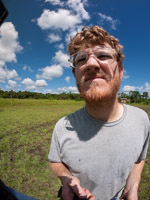 Keith Heyward (Director/Producer/Cinematographer) is an accomplished filmmaker, web developer, and interactive media designer working in some of the most extreme environments in the world, from Antarctica, to the Amazon, to the Arctic. He has created a wide range of media experiences from documentaries and educational content to multimedia art exhibits and music videos. He was a cinematographer for the Netflix Original Documentary Take Your Pills, which premiered at SXSW in 2018, as well as the documentary The Brink which premiered at Sundance in January 2019. In addition, he was a Director of Photography for NHK's Life Force 2 and the BBC's Super Smart Animals. His wildlife cinematography has been featured on TV programs like the BBC, National Geographic, the Weather Channel, and more. For the past five years, he has also worked as the Media Director and educator for the BURECS program at Boston University. This program educated undergraduates simultaneously in antarctic climate research and science journalism, creating media experiences deeply rooted in the research itself. He created the buriedice.com interactive website, offering a unique digital experience of the Antarctic Dry Valleys. He holds a B.Sc. in Biology from Brown University and has extensive experience as a scientific researcher around the world.
Keith Heyward (Director/Producer/Cinematographer) is an accomplished filmmaker, web developer, and interactive media designer working in some of the most extreme environments in the world, from Antarctica, to the Amazon, to the Arctic. He has created a wide range of media experiences from documentaries and educational content to multimedia art exhibits and music videos. He was a cinematographer for the Netflix Original Documentary Take Your Pills, which premiered at SXSW in 2018, as well as the documentary The Brink which premiered at Sundance in January 2019. In addition, he was a Director of Photography for NHK's Life Force 2 and the BBC's Super Smart Animals. His wildlife cinematography has been featured on TV programs like the BBC, National Geographic, the Weather Channel, and more. For the past five years, he has also worked as the Media Director and educator for the BURECS program at Boston University. This program educated undergraduates simultaneously in antarctic climate research and science journalism, creating media experiences deeply rooted in the research itself. He created the buriedice.com interactive website, offering a unique digital experience of the Antarctic Dry Valleys. He holds a B.Sc. in Biology from Brown University and has extensive experience as a scientific researcher around the world.
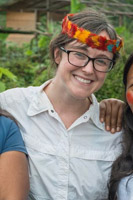 Jennifer Berglund (Director/Producer/Writer) is an award-winning writer, filmmaker and photographer at the intersection of science, nature and culture. Her work has taken her around the globe to all seven continents, from the depths of the Amazon Rainforest, to the Dry Valleys of Antarctica, and even the bottom of the Pacific Ocean. Her writings, films and photos have appeared in publications, televisions and big screens both nationally and internationally in film festivals and major publications, including Discover Magazine, Scientific American, the Discovery Channel, Animal Planet, and others. In 2017, she was named a National Science Foundation STEM Media Fellow at the 2017 Jackson Hole Wildlife Film Festival and the 2018 Science Media Awards & Summit, an honor bestowed upon emerging leaders in Science, Technology, Engineering and Math (STEM) Media professionals. In 2018, she was named a National Geographic Explorer, and received a grant to create a film about discovery in the deep ocean. She also works closely with world-renowned scientists and scholars at Harvard University to develop exhibits and media for the Harvard Museums of Science and Culture, a consortium of four museums spanning the disciplines of natural history, archaeology, anthropology, and the history of science. She holds a B.A. in Biology and a M.Sc. in Science and Medical Journalism from Boston University.
Jennifer Berglund (Director/Producer/Writer) is an award-winning writer, filmmaker and photographer at the intersection of science, nature and culture. Her work has taken her around the globe to all seven continents, from the depths of the Amazon Rainforest, to the Dry Valleys of Antarctica, and even the bottom of the Pacific Ocean. Her writings, films and photos have appeared in publications, televisions and big screens both nationally and internationally in film festivals and major publications, including Discover Magazine, Scientific American, the Discovery Channel, Animal Planet, and others. In 2017, she was named a National Science Foundation STEM Media Fellow at the 2017 Jackson Hole Wildlife Film Festival and the 2018 Science Media Awards & Summit, an honor bestowed upon emerging leaders in Science, Technology, Engineering and Math (STEM) Media professionals. In 2018, she was named a National Geographic Explorer, and received a grant to create a film about discovery in the deep ocean. She also works closely with world-renowned scientists and scholars at Harvard University to develop exhibits and media for the Harvard Museums of Science and Culture, a consortium of four museums spanning the disciplines of natural history, archaeology, anthropology, and the history of science. She holds a B.A. in Biology and a M.Sc. in Science and Medical Journalism from Boston University.
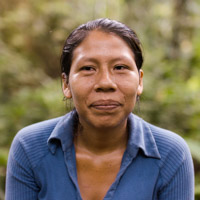 Gange Anita Yeti Enomenga (Producer/Writer) is a young Waorani woman from the community of Kewediono in the Ecuadorian Amazon, where she graduated from the Nontogodo Bilingual High School. As the eldest daughter of a prominent and traditional family in her community, and the granddaughter of Weba, the eldest member of the community, she is deeply rooted in the Waorani culture and is well versed in the Waorani's storytelling tradition. Her father, Eweme, is a respected cultural and ecological guide at the Waorani Ecolodge, and she has worked at the lodge herself for many years. Through this experience she has become a great facilitator between her culture, the rainforest, and the outside world. After being introduced to documentary making at filmmaking and photography workshops held by directors Heyward and Berglund, Anita took every opportunity to embed herself into the filmmaking process and use her new skills to further document her father and grandmother's knowledge. She became an invaluable member of the team, facilitating connections within her family and other families in the community, and guiding the direction of the story.
Gange Anita Yeti Enomenga (Producer/Writer) is a young Waorani woman from the community of Kewediono in the Ecuadorian Amazon, where she graduated from the Nontogodo Bilingual High School. As the eldest daughter of a prominent and traditional family in her community, and the granddaughter of Weba, the eldest member of the community, she is deeply rooted in the Waorani culture and is well versed in the Waorani's storytelling tradition. Her father, Eweme, is a respected cultural and ecological guide at the Waorani Ecolodge, and she has worked at the lodge herself for many years. Through this experience she has become a great facilitator between her culture, the rainforest, and the outside world. After being introduced to documentary making at filmmaking and photography workshops held by directors Heyward and Berglund, Anita took every opportunity to embed herself into the filmmaking process and use her new skills to further document her father and grandmother's knowledge. She became an invaluable member of the team, facilitating connections within her family and other families in the community, and guiding the direction of the story.
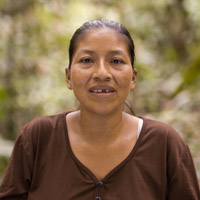 Obe Nenquimo Nihua (Producer/Writer) currently lives in Kewediono with her husband, Huiñari, and 8 children. She was the oldest student to graduate from the Nongi togodo Bilingual High School alongside Anita. Her dedication to documenting and preserving her culture is astonishing, simultaneously raising several children, working at the nearby ecolodge, and attending classes. From early stages of the project, she took the lead in organizing important filming trips to regions outside the community, interpreting and translating the filming, and finding and interviewing important Waorani leaders throughout the territory.
Obe Nenquimo Nihua (Producer/Writer) currently lives in Kewediono with her husband, Huiñari, and 8 children. She was the oldest student to graduate from the Nongi togodo Bilingual High School alongside Anita. Her dedication to documenting and preserving her culture is astonishing, simultaneously raising several children, working at the nearby ecolodge, and attending classes. From early stages of the project, she took the lead in organizing important filming trips to regions outside the community, interpreting and translating the filming, and finding and interviewing important Waorani leaders throughout the territory.
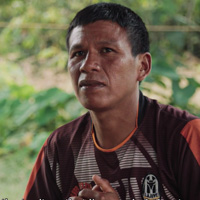 Huiñari Marco Toca Naaca (Co-Producer/Writer) currently lives in Kewediono with his wife, Obe, and 8 children. He attended the first nationally recognized Waorani high school in the community of Toñapare. He was the president of the Association of Kewediono from 2017-2019 and is a leader within his community. With exceptional knowledge of the forest, the region, and Waorani history and language, he has been a critical part of the production team throughout the 10 years.
Huiñari Marco Toca Naaca (Co-Producer/Writer) currently lives in Kewediono with his wife, Obe, and 8 children. He attended the first nationally recognized Waorani high school in the community of Toñapare. He was the president of the Association of Kewediono from 2017-2019 and is a leader within his community. With exceptional knowledge of the forest, the region, and Waorani history and language, he has been a critical part of the production team throughout the 10 years.
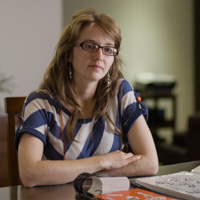 Ciara Wirth (Field Producer/Advisor) is a Doctoral candidate in the ecology and environment track of the Anthropology Department at Stanford University interested in human-animal interactions. She received her undergraduate degrees in Biology (specializing in zoology and ecology) and in Environmental Science and Policy from Duke University in 2010, and has worked in Waorani Territory in the Ecuadorian Amazon for over 10 years. Her research included participatory mapping and ethnozoology projects in collaboration with Waorani communities.
Ciara Wirth (Field Producer/Advisor) is a Doctoral candidate in the ecology and environment track of the Anthropology Department at Stanford University interested in human-animal interactions. She received her undergraduate degrees in Biology (specializing in zoology and ecology) and in Environmental Science and Policy from Duke University in 2010, and has worked in Waorani Territory in the Ecuadorian Amazon for over 10 years. Her research included participatory mapping and ethnozoology projects in collaboration with Waorani communities.
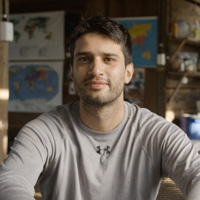 Emilio Rojas (Field Producer/Advisor) is a teacher with a Master's degree in Anthropology. He has taught at schools in Chile, the United States, and Ecuador, and has worked in Waorani Territory in the Ecuadorian Amazon for over 10 years. His work with the Waorani Nation included community advisor to legalize their school, voluntary teacher (focusing on traditional and project-based learning) and ethnozoology projects in collaboration with Waorani communities to create educational material.
Emilio Rojas (Field Producer/Advisor) is a teacher with a Master's degree in Anthropology. He has taught at schools in Chile, the United States, and Ecuador, and has worked in Waorani Territory in the Ecuadorian Amazon for over 10 years. His work with the Waorani Nation included community advisor to legalize their school, voluntary teacher (focusing on traditional and project-based learning) and ethnozoology projects in collaboration with Waorani communities to create educational material.
Kelly Swing (Project Advisor) is originally from North Carolina, and has lived in Ecuador since 1990. As a graduate student, conducted research primarily in the countries of Bolivia and Costa Rica and at the end of his doctoral program at LSU, he obtained a Fulbright scholarship to teach at the Universidad San Francisco de Quito. Since 1994, he has been director of the Tiputini Biodiversity Station within the Yasuni Biosphere Reserve and has collaborated with many scientists from around the globe. In 1995, Dr. Swing started the Boston University Tropical Ecology Program for which he has now presented over 140 field courses that put international students in contact with some of the greatest natural areas of the planet. Kelly's writings have appeared in newspapers, magazines, websites, and scientific journals, including Science and Nature. He has served as a consultant on many documentaries aired on BBC Nature, Animal Planet, National Geographic Channel among others. Various interviews with Dr. Swing have been broadcast in the United States by NPR and NBC and globally by BBC and CNN. His photographs have been displayed in a dozen expositions in various venues in Ecuador; he has provided still images for CNN, various documentaries, technical websites, scientific journals and other outlets. He is co-author of Yasuni, Tiputini and the Web of Life.
Ilisa Barbash (Project Advisor) is the Curator of Visual Anthropology at Harvard's Peabody Museum. She has co-directed/produced In and Out of Africa (1992, ZDF-Arte 1995) and Sweetgrass (2009, POV 2011). Sweetgrass premiered at the Berlinale and NYFF, and was a best documentary nominee for two Independent Spirit, Gotham, IDA and two Cinema Eye Awards. Barbash's book, Where the Roads All End: Photography and Anthropology in the Kalahari (2016) was awarded the Society for Visual Anthropology prize for best book about anthropology and photography. She co-wrote Cross-Cultural Filmmaking: A Handbook for Making Documentary and Ethnographic Films and Video; (1997), and The Cinema of Robert Gardner (2007).
